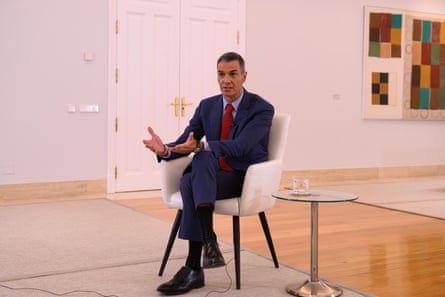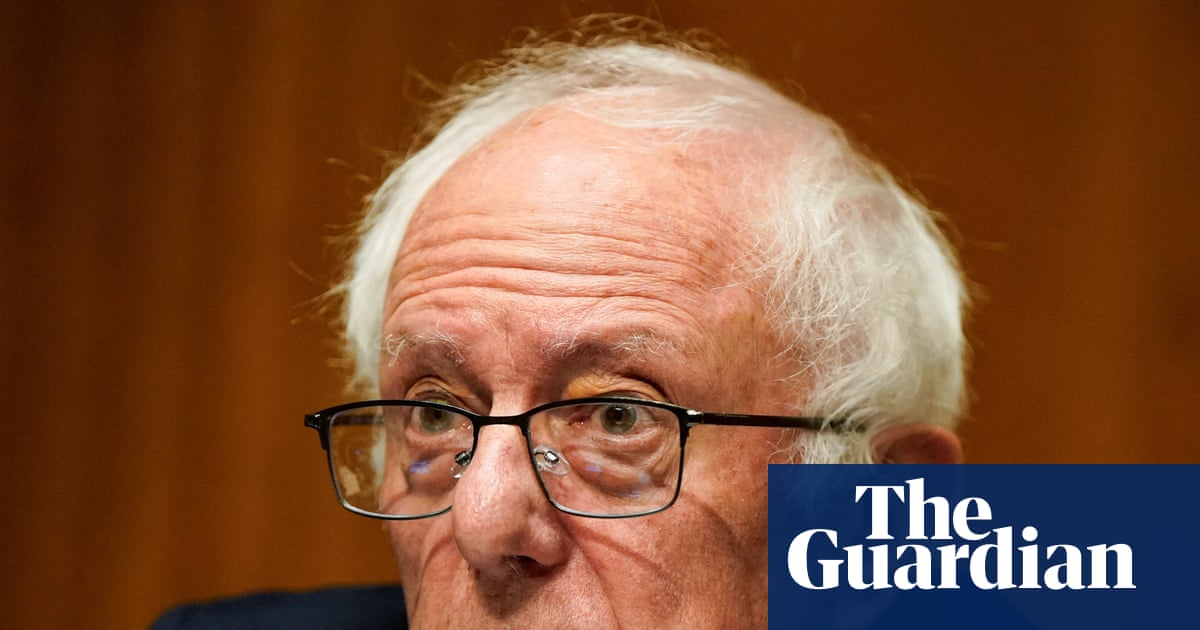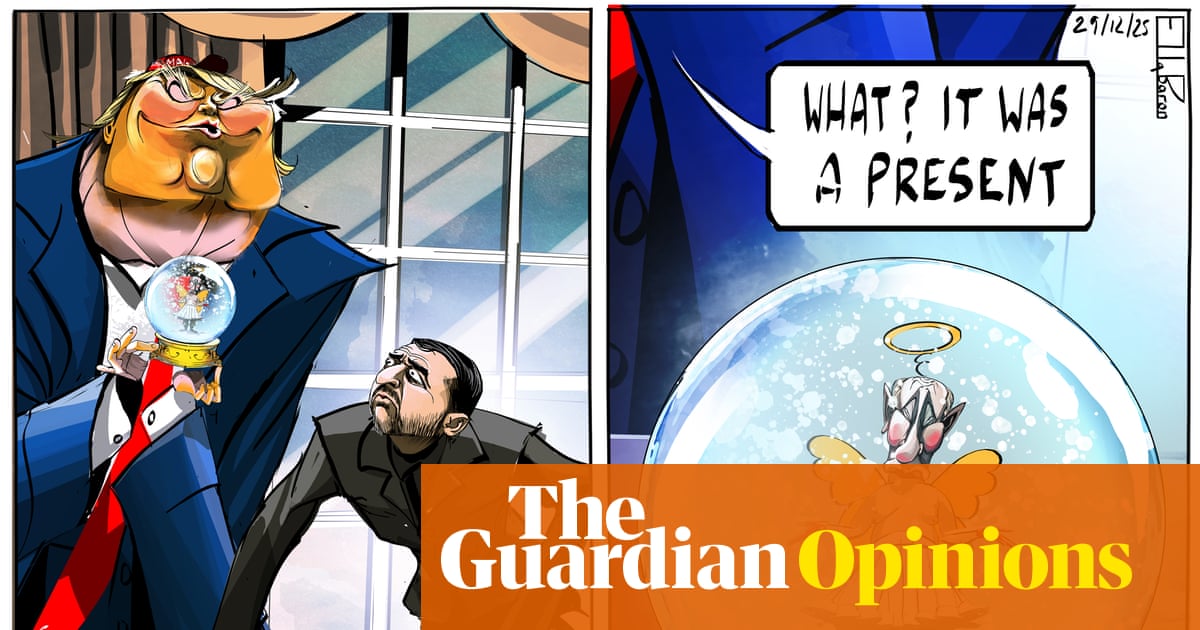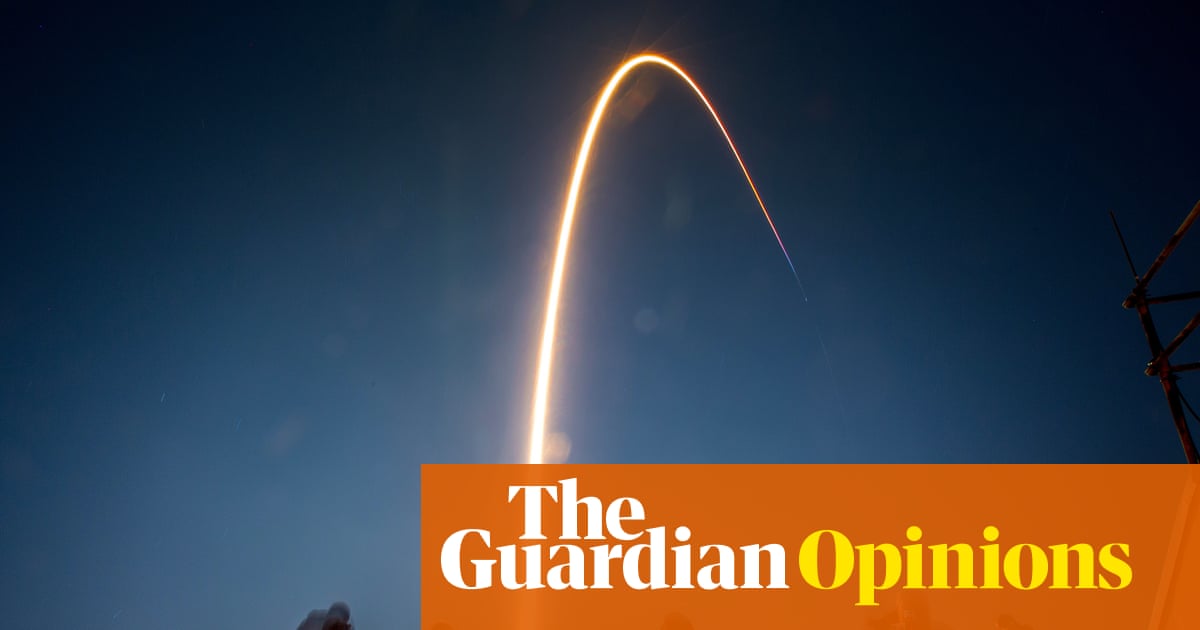When Pedro Sánchez and Keir Starmer meet in Downing Street on Wednesday it will be the first such bilateral summit between a Spanish prime minister and his British counterpart for more than a decade, an interregnum explained by Brexit and the now healed sore of Gibraltar.
The absence of highest level diplomacy has become more glaring given the two men are the leading social democratic leaders of Europe, facing similar problems of migration, souring populist parties, the climate crisis and divisions over how to minimise the damage caused to the European global influence by Donald Trump’s erratic unilateralism.
But in a Guardian interview with Sánchez in the prime minister’s office in Madrid, the contrasts, as much as the similarities, were on display in the political choices being made by the two leaders.
In many ways, Sánchez, putting aside the corruption allegations that dog his family and former senior advisers, is the kind of socialist that many ordinary British Labour party members crave as they urge their leadership to move away from a political agenda determined by Reform that they fear Starmer can never win.
Sometimes accused of not wielding Spain’s influence on the world stage – he was not invited to the recent European discussions with Trump – Sánchez showed a willingness to frame a values-based foreign policy that could transcend what he described as the transatlantic bond.

On migration for instance Sánchez, faced by Vox, the rightwing populist party currently at 15% in the polls, will not apologise for saying migration is a necessary boon to the economy. “I am willing to explain the figures and how migration is helping to boost the economy and to increase our social spending. We have to do it with clear data in order to fight the populist approach,” he said. “In Spain migration represents 25% of our per capita GDP, 10% of our social security revenues and only 1% of our public expenditure.”
Faced by accelerating population decline, western societies face a “dilemma between opening up and growing or closing off and shrinking”, he argued.
Far from talking about Spanish people “feeling like strangers in their own land”, he confidently predicts “the vast majority of Spanish citizens understand quite well that migration is an opportunity and not just a moral duty”.
One senses Sánchez regards the migration debate as less about identity and more about living standards and the economy, issues that will not be solved in Spain’s case without continued migration.
Sánchez has also shown himself willing to air his differences with Trump without, he insists, intentionally weakening the transatlantic relationship. At the recent Nato summit in June, Spain was the only country that refused to sign up to Trump’s demand to reach a target of defence spending at 5% of GDP by 2035.
Spain was a reliable Nato partner, he insisted, adding that in terms of capabilities Spain was meeting Nato commitments but the cost of reaching a target of 5% (Spain is just reaching 2.1 %) was one he has not willing to bear. On one estimate, it would require Sánchez to increase defence spending by €80bn (£69bn) a year, a proposal he would never get through his coalition government. He claimed that, as Nato’s southern flank, Spain faced different security threats to northern Europe.
At the summit, Trump responded to Spain’s refusal by threatening to double tariffs on Spain, saying he would personally oversee this negotiation and adding “the Spanish economy could be blown right out of the water”. But Sánchez said US tariffs are set for the whole of the EU and Spain cannot be singled out as a target. No punishment specific to Spain had been issued, he said.
Nor did Trump’s lingering threat hold him back from criticising US global leadership in a way that Starmer has been reluctant to articulate explicitly. “The shocking reality is that what we are witnessing is that the principal architect of the international order, which is the US after the second world war, is now weakening that order and that is not something positive for the US society or Europe,” he said, highlighting US cuts to global aid and defending the role of the World Trade Organization.
Sánchez has also led the way in Europe in criticising Israel’s actions in Gaza. In June, he directly accusing Israel of causing a genocidal situation, a verdict the UK government will not deliver, arguing only international courts can make such a judgment.
Since spring last year, Sánchez has argued not only that European states should recognise Palestine as a state, but also that the EU should suspend its trade association agreement – again, something the UK has also refused to do. He says the divisions within Europe over the past 18 months means the EU efforts on Gaza represent “a failure, absolutely”, arguing that he can only try to persuade more EU states until there is a majority for suspension. What he describes as the “darkest episodes of international relations in the 21st century” leave him with no other option, but he says he will not cut off diplomatic relations with Israel since that would only lose him any remaining influence.
The refusal to take concrete steps against Israel has damaged the west’s credibility with the global south, he says, and by displaying double standards weakened the cause of Ukraine.
The perceived moral void being left by the west will be filled, he predicted. The new partnership between India, China and Russia on display this week in Beijing may mask ideological conflicts, but “in politics, as in life, there is always someone who is going to fill the gap you leave, and that is what we are witnessing when it comes to some east Asian countries”.
But making an appeal to the global south on the biggest issues societies are facing, such as the climate crisis, was becoming harder owing to fissures in the west. After a summer of forest fires that in his view confirmed climate change was happening faster in Europe than the scientists predicted, he admits “the problem we are now facing is that there are traditional rightwing parties that perhaps don’t deny scientific reality, but they act and behave as if climate change does not exist”.
The traditional right, he said, by turning the scientific evidence of climate change into a traditional ideological political struggle “are committing their biggest mistake”.
“To combat climate change, you need resources, you need consistency, you need solidarity and you need a long term perspective, and unfortunately in politics nowadays we lack a bit of all that.” It is a depressing admission that in reality he could apply to all the dilemmas facing social democrats in government.

 3 months ago
47
3 months ago
47

















































